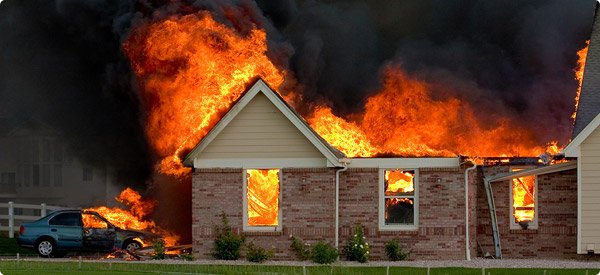
The holidays are upon us. Many of us are making plans to visit our families during the holidays. Others are just wanting to get out of the house from being stuck indoors for eight months due to this pandemic. And while we are all taking precautions to keep ourselves safe from the coronavirus, we must not forget that when the cold weather comes, when we decorate our homes with Christmas lights, when we use our ovens for preparing delicious holiday feasts, the risk of kitchen fires, electrical fires, or fires emanating from unextinguished cigarettes increase.
Last year, in the month of December, I was called by the American Red Cross to respond to seven fires. One of the worst fires I responded to was the Alpine Motel fire which claimed several lives and displaced dozens of Las Vegans. The Las Vegas Fire Department deemed at as being the most deadly structural fire recorded. I interviewed one survivor, a common step in the disaster relief process that enables eligible structural fire victims to be provided temporary financial relief with the Red Cross. The victim described to me several haunting attempts that survivors, and non-survivors, undertook, just to escape the inferno that engulfed a rotting motel complex. But what shook me the most was how the fire started.
The survivor explained to me that many of the motel units lacked adequate heating sources. The fire department confirmed that there were no heating sources and tenants had to deal with that and other maintenance issues that were never addressed. The fire department also confirmed the statements other survivors made; windows bolted down, emergency exits not operating properly or were locked, and fire alarms and fire suppression systems were inoperable. Clearly, this motel was only serving as a closing coffin for these innocent people.
Going back to the story, the survivor explained to me that a certain couple was using the oven to heat their unit. The comforting heat caused the couple to sleep early, not realizing that the oven was still in use and actively heating the rooms. At or around 3 am, they woke up to a blaze that engulfed their unit. But it was too late to escape as they became victim to asphyxiation. There were other tenants that were burned alive. Some survivors jumped out of second or third story windows, breaking their legs but surviving nonetheless. Children were tossed out of windows to residents who were waiting outside to catch them. Hearing these stories sent chills down my body. And although I have several war stories that are gruesome and terrifying which puts to questions why people would do such wickedness, this incident burned into my subconscious, leaving a permanent mark. This disaster is what inspired me to start my own venture, to educate, to train, and to prepare the community for all hazards and threats.
So how can you keep yourself, your loved ones, and your home from becoming another fire statistic? How can you prepare for the inevitable? By sticking to these basic principles and guidelines, you will be better equipped to prevent a holiday housefire from consuming you.
The first step anyone interested must do, is to create a plan. This plan must outline the preparations one must take to protect themselves from the occurrence of housefires, the mitigation measures that reduce the risk of future occurrences, the response actions that one must take when a housefire exists, and the recovery phase, or how the individual/family returns to a state of normalcy after the occurrence. The plan must also identify the different roles and responsibilities of the members in the household. The plan must also have an evacuation plan of all floors pertaining to the house. Each floor must have a primary and alternate escape routes and they must clearly be marked on the evacuation plan. Extinguishers should also be marked on the evacuation map, as well as the gas, electrical, and water shut off valves. You can add more icons if you think it will be helpful but remember, too much clutter marked on the fire evacuation plan could make it difficult to understand by guests. Another element that must be included in the plan is a list of emergency and important number, as well as a rendezvous point where family members who get separated due to a fire can easily meet up. Many county websites offer basic standardized fire escape plans that is good for starters. But for the personal touch, for a more detailed plan, one can always contact Stay Alert Stay Alive, LLC for customized and detailed fire/emergency response plans (for a nominal fee).The next thing a household must have is fire insurance. Fire insurance is mandatory in some states due to the environment and climate making it a vulnerable hotspot for fires, no pun intended. Without fire insurance, you will not be able to recover your losses and the burden of financial loss may destroy more than your house. So please get adequate fire insurance.
The next thing you should do is get prepared. Have adequate fire alarm systems and carbon monoxide detectors. Make sure your power outlets well maintained and any power strip or power blocks have a fuse, power surge protector, and is well maintained. do not use extension cords for long periods of time. Once the use of an extension cord is complete, disconnect it from and power source and store it safely. Ensure all electrical appliances are well maintained. Ensure any gas lines or gas appliances are not cracked, leaking, and well maintained. Ensure every member in the household knows how to shut off electric, gas, and water utility valves. Ensure every member of the household has an emergency 72-hour bug out bag. Important documents should be stored digitally, should be copied and stored somewhere safe, or should be stored outside of the homesite, such as a family member’s house, a safe deposit box at a bank, or at the county records office. Check your fire extinguishers. Make sure the the gauge reads in the green or fully charged, make sure they are not damaged or missing components, make sure there are at least two in every floor of the house, and make sure everyone is trained on how to use them.
Practice with your household by holding drills, talking about response actions, testing equipment, discussing “what if” scenarios, attend training with the fire department or CERT trainers, and most of all, volunteer with your community. You alone cannot survive every disaster. It takes a community working together to become disaster resilient.
For more information, advice, or inquiries, feel free to contact me via email at [email protected]. You may also send information to a Gmail account, if that is your preference. Send your correspondence to [email protected].
“We rely on our instincts to survive. Survival is an instinct” – Raul Cannon
